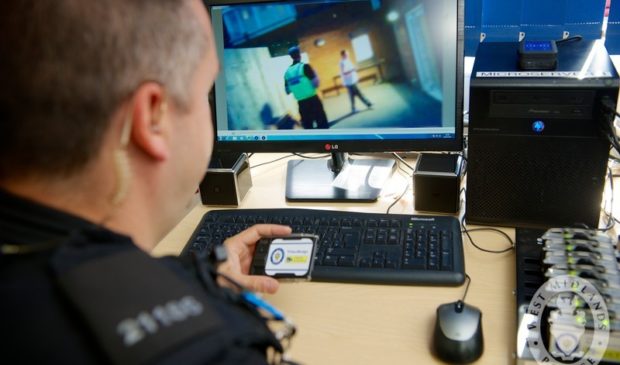Commission wants ongoing scrutiny of police body camera policies
Wednesday, July 6, 2016 by
Jack Craver Activists and city leaders who pushed for the Austin Police Department to equip its officers with body cameras continue to voice concerns about the implementation of the program, including whether it will bring the intended transparency and protect the privacy of crime victims and witnesses.
On Tuesday, the city Public Safety Commission approved a resolution encouraging the police department to continue talks with community groups over ways to improve policies relating to the use of body cameras as well as the disclosure of footage obtained by the cameras to the public.
A resolution approved by City Council last month directed the city manager to organize meetings between the police department, the Office of the Police Monitor and stakeholder groups to discuss potential revisions to the body camera policy over the next four months, culminating in a report to Council on the results of that process.
But members of the commission agreed that the new policy warranted scrutiny and feedback from the community even after implementation. The resolution they adopted thus called on the police department to hold four stakeholder meetings in 2017.
Community input will become better informed and more valuable as more police officers begin wearing the body cameras, argued Commissioner Daniela Nunez, who authored the resolution.
At the request of Commissioner Kim Rossmo, a clause to the resolution was added recommending that the city perform a comprehensive evaluation of the program’s effectiveness and costs after two years. Rossmo urged for that change after saying he anticipated that the eventual cost of the program would be far greater than initial estimates.
Matt Simpson, policy strategist at the ACLU of Texas, said he remained concerned by the department’s insistence that footage of a critical event not be released until the conclusion of any internal or criminal investigation associated with it. That could mean that the public is denied access to videos for months or even years after the event, he said.
Fatima Mann of the Austin Justice Coalition similarly said that the camera policy remained vague as to “how and to whom will the recordings be released.” Furthermore, she said the stakeholder process needed to be more diverse and include more input from the African-American and Latino communities.
“I was the only black person in the room having this conversation,” she said about a recent stakeholder meeting.
Both Simpson and Mann voiced optimism about the police department’s willingness to entertain changes to its policy. Simpson highlighted the department’s agreement to make it a policy for officers to notify citizens during an interaction that the camera is rolling, a practice that Simpson said will generally produce more positive interactions. He also noted support for language the department was developing to ensure that victims of violent crimes, including domestic abuse, be allowed to request that an officer turn off the camera during an interview.
Rossmo, a former Vancouver police officer, remained concerned that footage of crime victims and witnesses would be accessible to “nosy reporters” or others with “voyeuristic” motives. Under the proposed policy, crime victims being interviewed in a private space, such as their homes, could request that the camera be turned off and would have to give written consent for the video to be released.
In many cases, Rossmo pointed out, the victim would be in a public place.
“I’ve had encounters with rape victims in a back alley or in a parking lot,” he said. “They’re in no position to be making informed decisions about filming. They’re worried about getting to a hospital, they’re worried about the offender who has just attacked them. There’s 800 things more important to them than declining the video.”
Photo by West Midlands Police made available through a Creative Commons license.
You're a community leader
And we’re honored you look to us for serious, in-depth news. You know a strong community needs local and dedicated watchdog reporting. We’re here for you and that won’t change. Now will you take the powerful next step and support our nonprofit news organization?



